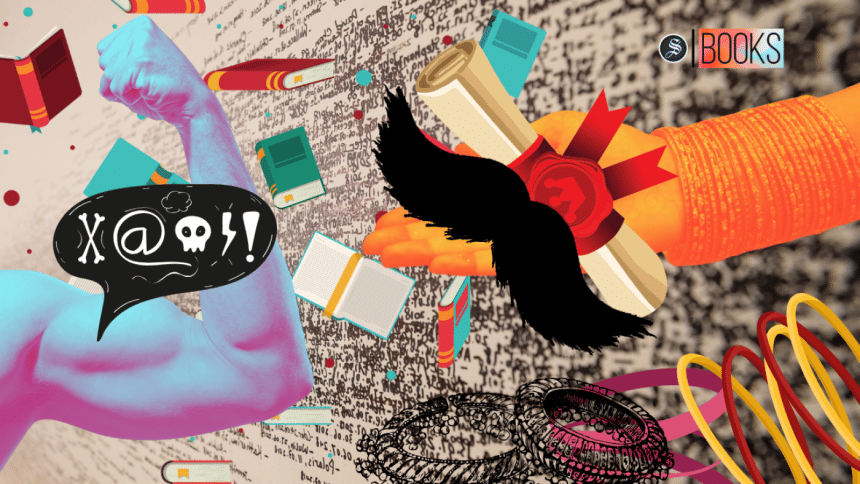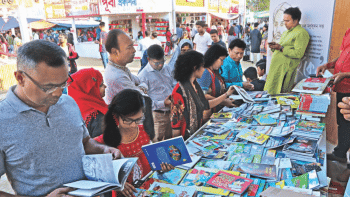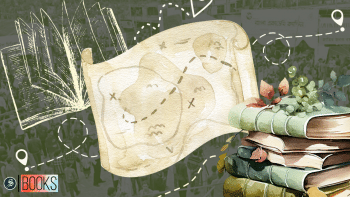Of language and sexism: We are what we speak

Churi pore boshe thako.
The very first time I'd heard these words as a teenager, I'd snickered. Fuelled with the need to please, I'd joined in to mock a classmate. A little harmless fun. Hilarious, even. Fast forward to university, and I heard it again. This time I checked myself. I questioned the need to portray such sexist thinking. What did it infer? And who was it really harming?
Mard ban. Be a man. A dialogue from a popular movie, ironically depicting male bonding but not getting into the root of the remark. Was it really encouraging a man to stand up for his rights? Was it asking him to not show vulnerability? Or was it simply asking him to not be a woman?
In a fit of rage directed at me, someone had once sputtered, "Grow some balls!"
"Not physically possible." I replied nonchalantly. "But if you're asking me to gain courage, I'm working on it."
Suffice it to say that didn't go down too well with that person.
In Wordslut: A Feminist Guide to taking back the English Language (2019), Amanda Montell states that gender is directly linked to power in many cultures, as is language. It's just that we are unable to identify the difference. People use language to express gender. Gender also impacts a person's speech and how that speech is perceived. Montell argues that language is increasingly genderised, leaning towards women's linguistic disparagement. The words madam and mistress, initially referring to formal terms of address, have since been downgraded to terms of addresses in professions looked upon unfavourably. On the other hand, sir and master have evolved to refer to being of a higher social standing or someone who has conquered a difficult skill. Come to think of it, MistressChef doesn't quite fit the bill, does it?
In her 1975 paper, "The Semantic Derogation of Woman", linguist Muriel Schulz describes semantic change, the process of how words and meanings evolve over time. There are two types of semantic change: pejoration where a meaning of a word starts out as neutral or positive but devolves into a negative meaning; and amelioration, which does the opposite.
Schulz explains that in terms of describing a woman, words with positive connotations gradually acquire negative implications, ultimately becoming abusive or ending as a sexual slur. Think of another name for a female dog. Or to travel 800 years earlier, the same term used to refer to genitalia for either sex.
Montell also states that pejoration rebrands a feminine word as an insult for men. Originally, buddy and sissy were abbreviations for brother and sister. Although buddy ameliorated into meaning a friend, sissy pejorated to mean a weak or effeminate man. However, the term dude ameliorated in the 19th century from being an insult to mean a vain or pretentious man to, well, simply a man.
I once overheard a man telling his five year old son to 'stop being a princess' when he'd fallen and hurt himself. The tears on the little boy's face irked the father. The oft-repeated-now-it's-a-cliché phrase "boys don't cry" came to my mind. But this boy, all of five, was crying because he was in pain. He was also ashamed, as if the tears he was shedding stripped him off his masculinity. When this little man grew up to be a big man, he recalled his father's words. He was a man. He had to suppress emotions. Emotions were for women.
"If you want to insult a woman, call her a prostitute. If you want to insult a man, call him a woman"--one of the most popular quotes from Montell's book. And in the case of this man, the sad truth.
The English language dictionary was created in the late 1700s. Three centuries later, we are moving away from gendered words and embracing gender neutral language. We are now actors, chairpersons, flight attendants, waitstaff, homemakers, stay at home mums and dads. We now have parental leave and parental rights. But while we train ourselves to use newer vocabulary, why are we not evolving in our thoughts and beliefs and opinions? Why are we holding ourselves back from thinking outside the frame of our thoughts?
Why are bachelors considered eligible and spinsters old maids? Why are Bachelor's and Master's degrees so clearly gendered? Why are men assertive and women bossy? Why is self-assurance a sign of confidence in men and vanity in women? Why does the word 'bold' hold different meanings for both sexes?
In her 1985 book, Man Made Language, Dale Spender states that languages are essentially male, because they were constructed by those in power in society. This is corroborated by translator Arunava Sinha in a podcast, Mehfil - Translating South Asia. Sinha states, "You can use the vocabulary of the oppressor without being an oppressor yourself. There is inherent misogyny in the Bangla language itself, but because we are so used to hearing it every day we don't perceive it as such. We never stop to think about the negative implications of certain terms we use in our everyday conversations."
In the same podcast, translator Shabnam Nadiya noted that when she looked back at the work she had translated over the years, she was "appalled at the level of objectification and I don't think any of it is done with intent. It's just the way it is because that's the way our culture is."
If we're proficient at gendered insults, we are just as adept at gendered compliments. One Eid, I complimented my young niece on how pretty she looked. Just like Elsa, her favourite fairytale princess, I told her. I complimented my young nephew on how strong he was, just like Superman. I chose my words carefully because these were compliments they wanted to hear or had been conditioned to hear. Reflecting on this, why didn't I tell my niece she was pretty but also strong and brave like Elsa? Why didn't I tell my nephew that he was strong but also kind and helpful like Superman? It is no small wonder that girls grow up with negative body images and boys grow up emotionally stunted.
In an article for the Guardian, "We Need a New Way to Swear … One That Doesn't Demean the Women of India", journalist Nilanjana Bhowmick states that gendered slurs are so embedded in our everyday speech that we use them without stopping to think. In unguarded moments, we spit them out. She states that most profanities are profoundly sexist, and so deeply ingrained that even women use curses that humiliate other women. This gendered language of anger is still contributing to the propagation of a culture of toxic masculinity.
Sunil Jaglan, founder of the Gaali Band Ghar (No Abuse Household) project, visited schools across India, encouraging them to use a chart to list the curses they'd heard. When asked how that would help curb misogyny, he replied that when we see the abuse uttered every day written down in black and white, it has a shock value.
Misogyny isn't only the depiction of physical acts of violence against women. Misogyny lies in sexist remarks and verbal abuse, whether intentional or embedded in thought and speech such as a passing comment made in jest, such as mocking a man for being effeminate or using the term, 'weaker sex'. Are we desensitised to comments made against women in media and literature? Where do we draw the line? Why is the usage of such words acceptable and even condoned?
We use language to 'cancel' out those we perceive have wronged us. Language is used to dehumanise, to vilify, to silence. It is used to glorify, to empower, to defend, to rally. But it can also be used to honour, to protect, to respect.
I understand that none of this is new. This has been talked about, researched, argued, and debated many times before. Yet, where is the change? If language has evolved so we can express ourselves with a better vocabulary, more informed choices, consent and debates, why has it not played a role in evolving our attitudes towards gender?
We elevate the status of mothers in matribhasha, matribhumi, mother language, mother tongue. We have a dedicated day worldwide to celebrate our mother language. But is it just relegated to the language we speak? Does this gendered term have any bearing on the way we think?
The Bible points out that there's no greater weapon than our tongue. It can slash, cut, and create deep wounds to scar one for life. Or it can soothe, elevate, and heal those same wounds. So the next time we use language that may be deemed derogatory, let's stop to think how it will be perceived. Because in essence, and especially in today's digital age, where our voices can be heard far and wide, we are what we speak. If what we speak is questionable, it's a sorry state of affairs. And if language is ever evolving, why are we falling behind?
Nabilah Khan lives in Sydney, Australia. A self-proclaimed coffee snob, she loves lazy brunches and deep conversations.

 For all latest news, follow The Daily Star's Google News channel.
For all latest news, follow The Daily Star's Google News channel. 











Comments